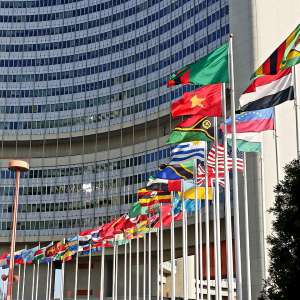OHADAC Representation of the meeting of the UNCITRAL Working Group N°III: Reform of the framework of Investors-States dispute settlement
- 2020-01-29
- 4389
The team in charge of implementing the OHADAC project was represented at the 39th session of the UNCITRAL Working Group N°III held in Vienna from 20 to 24 January 2020.
The ACP Legal Association, responsible for the execution of the OHADAC project, indeed has observer status within the working group since July 2019.
The UNCITRAL Working Group N° III has been set up during the 50th session of the United Nations Commission meeting in 2017, with the task of considering the need to reform the dipsute resolution proceedings framework in the field of investment protection and given the case ensure its implementation.
This working group is composed of representatives coming from the UNCITRAL member States.
During the first meetings of this working group, the latter concluded that there was a need for the framework reform and set up of a timetable for assessment of the different options for an international system in investment protection.
The options analysed during the working sessions week of January 20th were the following:
(i) Setting up an appeal mechanism for arbitral award on agreed terms concerning investment, institutionalised or ad hoc disputes.
The advantage of establishing an appeal recourse mechanism would allow to better control the quality of decisions rendered and the emergence of a harmonised jurisprudence in the field of investment protection what is most likely needed today.
The member States have considered if this mechnaism could coexist with the current investment arbitral proceedings system or if it should be set up as a second degree court level within the context of a permanent tribunal. The creation of a permanent tribunal for investment dispute settlement was moreover the second reform option considered during these working sessions.
(ii) Establishment of a multilateral court composed of permanent judges, in charge of the settlement of investment dispute procedural issues and superseding the arbitration system as it currently exists.
This court could integrate an appeal mechanism that could also be applicable with permanent judges.
The issues tackled by the States concerned the financing of such a Court, the selection method of the permanent judges and the enforceable framework of decisions that would be rendered by the court.
Concerning the selection process to designate judges, the Caribbean Court of Justice existing framework retained the working group's proposal. Indeed this system provides for the establishment of a panel of judges to settle litigations determined by their counterparts also acting as permanent judges. Such a system would also prevent any designation from States and thus reducing any possible political interference when composing committees in charge of ruling for settlement of a given case.
The next working session will be held in New York, from March 30th to April 3rd.
Other pertinant options will be discussed in the field of exploring different mechanisms that could allow to reform the investment protection system as it is currently implemented.
In particular, member States representatives are invited to reflect upon the following techniques:
- Development of mediation and dispute resolution techniques;
- Interpretation of treaties by States Parties;
- To have recourse to the surety bond technique for costs of arbitral proceedings in the context of abusive claims;
- Multiple arbitral proceedings management and treaty claims;
- Adoption of a multilateral tool to reform an investment protection system for dispute resolution.
Once the Working Group will have explored all different options proposed within the context of the reform project on investment dispute resolution mechanisms, important decisions related to specific reform methods will be implemented. This decision will then be formalised by the possible adoption of new instruments and the setting up of new institutions.







